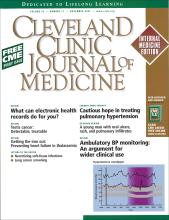Index by author
Malangoni, Mark A.
- You have accessIn reply: Necrotizing soft-tissue infections (supplement 4 to volume 74, August 2007)James I. Merlino, MD and Mark A. Malangoni, MDCleveland Clinic Journal of Medicine November 2007, 74 (11) 768-769;
Mandell, Brian F.
- You have accessThe arrival of ‘hunt-and-peck’ medicineBrian F. Mandell, MD, PhDCleveland Clinic Journal of Medicine November 2007, 74 (11) 767;
I initially had concerns when told that we would be typing all of our visit notes directly into the computer, but I was pleasantly surprised by the benefits of adopting electronic health records.
Mehta, Neil B.
- You have accessElectronic health records: A primer for practicing physiciansNeil B. Mehta, MD and Mary H. Partin, PhDCleveland Clinic Journal of Medicine November 2007, 74 (11) 826-830;
Electronic health records have the potential to improve the quality of patient care, reduce the cost of health care, and expedite the transfer of information. Yet fewer than 20% of hospitals and physician practices now use them.
Merlino, James I.
- You have accessIn reply: Necrotizing soft-tissue infections (supplement 4 to volume 74, August 2007)James I. Merlino, MD and Mark A. Malangoni, MDCleveland Clinic Journal of Medicine November 2007, 74 (11) 768-769;
Minai, Omar A.
- You have accessTreating pulmonary arterial hypertension: Cautious hope in a deadly diseaseOmar A. Minai, MD and Marie M. Budev, DO, MPHCleveland Clinic Journal of Medicine November 2007, 74 (11) 789-806;
Advances have brought cautious hope for patients with this progressive and deadly disease. Intravenous prostanoids are still the most effective drugs for long-term treatment, but oral options are available for some patients who can be closely monitored.
Muslin, Anthony J.
- You have accessGetting the iron out: Preventing and treating heart failure in transfusion-dependent thalassemiaDanish A. Jabbar, MD, Glenn Davison, MD and Anthony J. Muslin, MDCleveland Clinic Journal of Medicine November 2007, 74 (11) 807-816;
Chronic accumulation of iron due to regular blood transfusions leads to heart failure and death at a very young age, but chelation can avert this fatal outcome.




